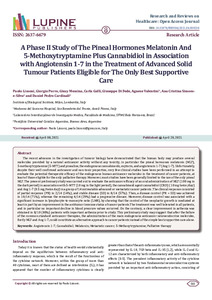Por favor, use este identificador para citar o enlazar este ítem:
https://repositorio.uca.edu.ar/handle/123456789/13686| Título: | A phase II study of the pineal hormones melatonin and 5-methoxytryptamine plus cannabidiol in association with angiotensin 1-7 in the treatment of advanced solid tumour patients eligible for the only best supportive care | Autor: | Lissoni, Paolo Porro, Giorgio Messina, Giusy Galli, Carla Di Fede, Giuseppe Valentini, Agnese Simoes-e-Silva, Ana Cristina Cardinali, Daniel Pedro |
Palabras clave: | ANGIOTENSINA 1-7; CANNABINOIDES; MELATONINA; CANCER; METASTASIS; CUIDADOS PALIATIVOS | Fecha de publicación: | 2021 | Editorial: | Lupin | Cita: | Lissoni, P. et al. A phase II study of the pineal hormones melatonin and 5-methoxytryptamine plus cannabidiol in association with angiotensin 1-7 in the treatment of advanced solid tumour patients eligible for the only best supportive care [en línea]. Research and reviews on healthcare. 2021, 6 (2). doi: 10.32474/RRHOAJ.2021.06.000234. Disponible en: https://repositorio.uca.edu.ar/handle/123456789/13686 | Resumen: | Abstract: The recent advances in the investigation of tumour biology have demonstrated that the human body may produce several molecules provided by a natural anticancer activity without any toxicity, in particular the pineal hormones melatonin (MLT), 5-methoxytryptamine (5-MTT) and pinealine, the endogenous cannabinoids, oxytocin, and angiotensin 1-7 (Ang 1-7). Unfortunately, despite their well confirmed anticancer and non-toxic properties, very few clinical studies have been performed in an attempt to evaluate the potential therapeutic efficacy of the endogenous human anticancer molecules in the treatment of cancer patients, at least of those eligible for the only palliative therapy. Moreover, most studies have been generally limited to the use of the only pineal MLT. The present preliminary study was carried out to evaluate the anticancer efficacy of an oral administration of MLT (100 mg in the dark period) in association with 5-MTT (10 mg in the light period), the cannabinoid agent cannabidiol (CBD) ( 10 mg twice/day) and Ang 1-7 (0.5 mg/twice day) in a group of 14 untreatable advanced or metastatic cancer patients. The clinical response consisted of partial response (PR) in 2/14 (14%), and stable disease (SD) in 8/14 (57%). Then, a disease control (PR + SD) was achieved in 10/14 (71%), whereas the remaining 4/14 (29%) had a progressive disease. Moreover, disease control was associated with a significant increase in lymphocyte-to-monocyte ratio (LMR), by showing that the control of the neoplastic growth is mediated at least in part by an improvement in the antitumor immune status of cancer patients.The treatment was well tolerated in all patients, and in particular no important decline in blood pressure values occurred. On the contrary, a clear improvement in asthenia was obtained in 8/10 (80%) patients with important asthenia prior to study. This preliminary study may suggest that after the failure of the common standard anticancer therapies, the administration of the main endogenous anticancer neuroendocrine molecules, firstly MLT and Ang 1-7, could constitute an alternative approach to cancer patients instead of the simple best supportive care alone. | URI: | https://repositorio.uca.edu.ar/handle/123456789/13686 | ISSN: | 2637-6679 | Disciplina: | MEDICINA | DOI: | 10.32474/RRHOAJ.2021.06.000234 | Derechos: | Acceso abierto | Fuente: | Research and reviews on healthcare. 2021, 6 (2) |
| Aparece en las colecciones: | Artículos |
Ficheros en este ítem:
| Fichero | Descripción | Tamaño | Formato | |
|---|---|---|---|---|
| phase-ii-study.pdf | 394,08 kB | Adobe PDF |  Visualizar/Abrir |
Visualizaciones de página(s)
101
comprobado en 27-abr-2024
Descarga(s)
59
comprobado en 27-abr-2024
Google ScholarTM
Ver en Google Scholar
Altmetric
Altmetric
Este ítem está sujeto a una Licencia Creative Commons

